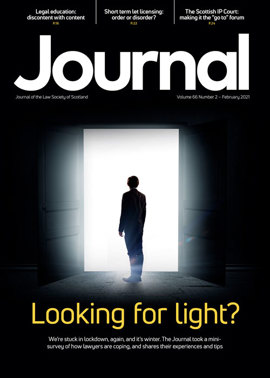Charities: commerce as public benefit?
In Office of the Scottish Charity Regulator, Appellant [2021] CSIH 7 (29 January 2021), the Inner House dismissed OSCR’s appeal against the Upper Tribunal’s decision that two trading subsidiaries of a charity should be entered on the Scottish Charities Register, despite both having activities which were commercial in nature, because all their activities provided public benefit and contributed to advancing their charitable purposes.
Background
The appeal concerned two limited companies (NLTL and NLHL), wholly owned by New Lanark Trust (NLT). NLT is a registered charity responsible for managing the UNESCO World Heritage Site at New Lanark. The companies’ principal purpose is to produce income through various trading activities, to be donated by gift aid to NLT. NLTL operates a visitor attraction (with entry fee), a retail shop and café. NLHL operates a hotel, conference centre and wedding venue within New Lanark village.
The companies applied to OSCR for entry on the register. OSCR refused registration on the grounds that neither company provided “public benefit” within the meaning of the Charities and Trustee Investment (Scotland) Act 2005, s 7(1)(b). They therefore failed to satisfy the charity test.
OSCR’s decision
OSCR recognised that some of NLTL’s activities, such as exhibitions, events, tours and maintenance of the buildings, contributed to the public benefit provided by NLT. However, the shop and café had a large combined turnover; neither were in furtherance of NLTL’s charitable purposes or incidental thereto.
Similarly, NLHL’s significant activities were not understood to be furthering charitable purposes, despite its distribution of profits to NTL providing benefit to the public. NLHL’s primary activities were not directly related, connected or incidental to its charitable purposes. It followed that there was no public benefit.
Before the tribunals
 The First-tier Tribunal (FtT) agreed with and upheld OSCR’s decisions. For both NLHL and NLTL, the contribution to the advancement of charitable purposes was secondary to the principal, commercial activities.
The First-tier Tribunal (FtT) agreed with and upheld OSCR’s decisions. For both NLHL and NLTL, the contribution to the advancement of charitable purposes was secondary to the principal, commercial activities.
The Upper Tribunal (UT) allowed an appeal and directed that the companies be entered in the register. It concluded that the FtT had not provided adequate and intelligible reasons for its decision: the FtT failed to consider whether the commercial activities of each of the companies were in furtherance of their charitable purposes ([2019] UT 62; [2019] UT 63).
Going on to remake the decisions ([2020] UT 9; [2020] UT 10), the UT considered OSCR’s analysis, which suggested two commercial activities that would not compromise the public benefit requirement: (i) where the activity contributes to furthering the charitable purposes; and (ii) where the activity is merely incidental. The UT held that OSCR’s reasons for refusing the companies’ applications, which were based on (ii), missed the point of the companies’ arguments, which were based on (i). The companies submitted that the provision of the commercial facilities in the setting of New Lanark village amounted to public benefit. OSCR responded to suggest these were “non-primary purpose trading”.
The UT held that a commercial activity could have a dual purpose of raising funds and contributing to charitable purposes. In that case, a balancing exercise between these was inappropriate and unnecessary. If public benefit was provided, it was irrelevant that the companies also raised funds for their own benefit or that of another charitable body. On that basis, the appeal turned on the factual question of whether the companies’ commercial activities contributed to the furthering of their charitable purposes. From the findings in fact, the UT concluded that they did. It was a crucial feature of the site that it was maintained as a living village so visitors could experience the original concept that led to its World Heritage designation: the availability of commercial facilities was an integral part of the presentation, contributing to the experience and providing public benefit.
Inner House
OSCR appealed. The Inner House refused the appeals, which were essentially against the UT’s conclusions on matters of fact when remaking the decisions about whether all of the activities advanced the companies’ charitable purposes. The UT reached conclusions that it was entitled to make. The court suggested that OSCR erred in its interpretation of the UT’s decision: as the UT found all the activities advanced the companies’ charitable purposes, it correctly decided that a balancing assessment between activities was not required. The balancing exercise would be required if only some of the activities had advanced the companies’ charitable purposes. That was not the case here.
Comment
The significance of this case is limited, given the unique circumstances that the companies carried out all their activities within their UNESCO site. It is, however, an important decision for providing clarity on how the tribunal will approach cases where commercial activities are in issue in relation to the charity test.
The Inner House confirmed that, where all of a company’s commercial activities advance its charitable purpose, when assessing public benefit a balancing exercise is not required, but that in “mixed” cases, performing a balancing act would be appropriate.
Regulars
Perspectives
Features
Briefings
- Criminal court: Discount season
- Family: Capital values in uncertain times
- Employment: Can employers require staff vaccination?
- Human rights: Protecting the child claimant
- Pensions: a bill with teeth
- Charities: commerce as public benefit?
- Property: Playing safe: on the right track?
- In-house: Wide world of in-house
In practice
- Priorities for our Parliament
- The Word of Gold: The gift that keeps on giving
- TRS: more trusts, more information, more access
- A proper conclusion
- The Eternal Optimist: Putting resolve into resolutions
- Appreciation: Professor Emeritus Robert Rennie
- Ask Ash: Trainee in a rut
- Royal Faculty invites new members







